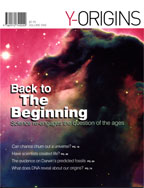A FINELY TUNED GALAXY
Galaxies are formations of from millions to perhaps a trillion stars. Our own galaxy is called the Milky Way. It’s unknown how many galaxies the universe contains, but it may be around a trillion. Surprisingly, given the great number of these star groups, most galaxies are incompatible with life.
In order for life to exist in a galaxy, it needs to meet several criteria.12 The following are just three of the fine-tuned characteristics a galaxy needs to support life:
-
Not too large a galaxy. Our Milky Way is enormous, measuring 100,000 light-years from end to end. However, if it were just a bit larger, too much radiation and too many gravitational disturbances would prohibit life like ours.
-
Not too small a galaxy. On the other hand, a stable Earth orbit that is necessary for life could not exist if our galaxy were slightly smaller. And a smaller galaxy would result in inadequate heavy elements, such as iron and carbon, essential to life.
Our Milky Way galaxy meets these and many other conditions essential for life. Most of the others do not.
When we focus in even closer, on our own star and its planets, the odds for life being possible become even more extreme.
|




